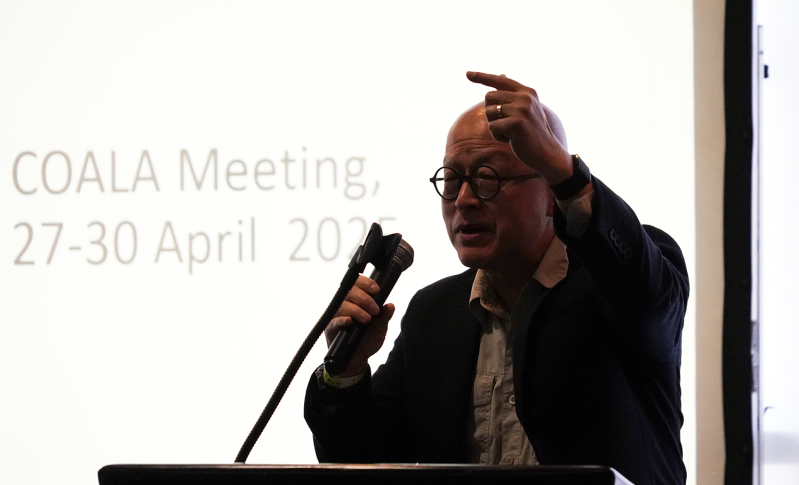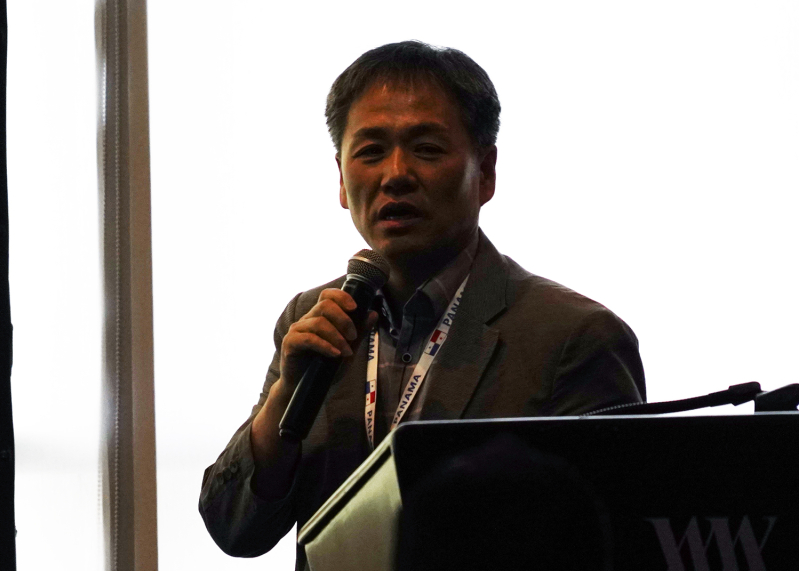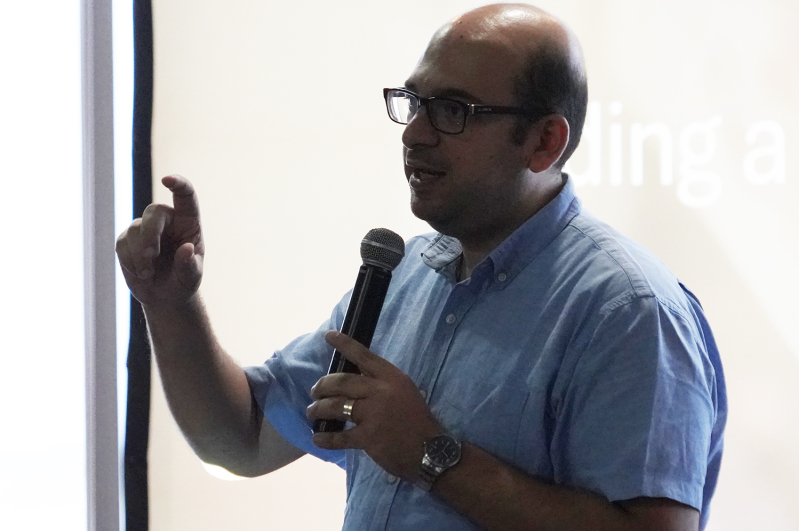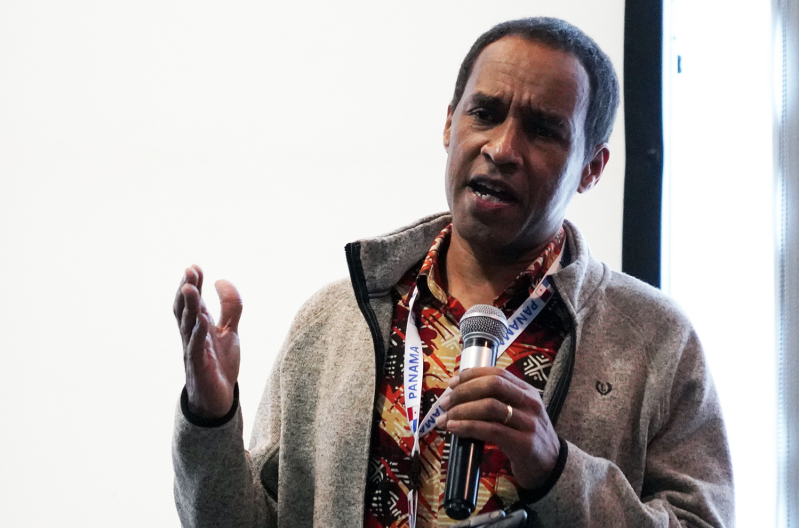
Fifty leaders from across the Global South gathered Monday morning (April 28) for the first plenary of the second day at COALA3.0, the Christ over Asia, Latin America and Africa movement’s conference, to focus on “building common ground" in a rapidly changing mission landscape.
The session opened with a devotional by Rev. Dr. Samuel Chiang, deputy secretary general of the World Evangelical Alliance (WEA), who challenged participants to reflect deeply on the social ethics of Jesus as outlined in the Sermon on the Mount.
Drawing from Matthew's Gospel, Chiang emphasized confronting power structures, embracing the marginalized, cultivating humility, and building just and generous communities. "Politics and ethics are crucial for how we make decisions and live out our witness," he said, urging the audience to "think about governance, decision-making, and community" in both sending and receiving church contexts.
Chiang also encouraged leaders to remember that movements across history, from the 10/40 Window to Vision 5:9 and beyond, were fueled by communities willing to embody Christlike humility and justice. "The constitution of the Gospel is the Sermon on the Mount," he said. "Jesus redefines success, leadership, and community ethics."
Following the devotional, three keynote speakers — Paul Noh from Korea, Tamer Maher from Egypt, and Peter Oyugi from Kenya — each addressed the theme of "Building a Common Ground" for collaboration among churches and mission movements in the majority world.
Paul Noh: Returning to Jesus as the common foundation
Paul Noh, a Korean missiologist and missionary to China for over 25 years, opened the plenary with a call to rediscover a common foundation rooted in Christ Himself.

"In facing the vast diversity of the global South, we cannot build a movement unless we are anchored in Jesus," Noh said. He traced the development of indigenous mission models, contrasting the early reliance on Western strategies with a growing realization among Korean and Asian churches that "contextual, incarnational" approaches are essential.
Noh warned against both opposing and attempting to replace existing mission structures. "We must not substitute or compete against established agencies," he said. "Instead, we must influence and impact them by embodying servant-hearted, Christ-centered mission."
Reflecting on the struggles of the Western church, Noh cited the late John Stott and argued that "the contemporary global church must repent of pessimism and return to the victorious, crucified Christ."
He stressed that true commonality lies in embracing Christ's model of suffering, diversity, and restoration. "Just as the early church spread from Jerusalem to Antioch, Rome, and beyond, we must celebrate diversity and build unity on the foundation of the Holy Spirit's work," he said.
Noh concluded with a challenge: "Global South churches must prioritize transformation over power, prayer over policy, and humility over hierarchy."
Tamer Maher: Redefining success through the lens of family
Tamer Maher, a leader of mission collaboration in Egypt, offered a passionate plea to "redefine the language" Christians use when discussing unity, success, and mission.

Maher warned that many church leaders unconsciously adopt a "business mindset," viewing ministry as a competition for resources, recognition, and growth.
"In a family, your value is not based on performance," he said. "My two-year-old daughter has achieved nothing, yet she is beloved." In contrast, business models reward productivity and competition, undermining true Christian unity.
To build common ground, Maher argued, churches must first agree on foundational definitions: "Who is God? Who are we? What is success?" True success, he said, is measured not by church size, fame, or resources but by "faithfulness to God's purposes" and "mutual support within the Body of Christ."
He illustrated this by describing a network of pastors in Cairo who, for five years, have met monthly simply to pray and encourage one another — without any formal agenda. "It took three years before we even talked about inviting our churches to pray together," Maher noted. "Unity grows slowly, rooted in love."
Maher also shared a story of how his own church shifted from organizing evangelistic events independently to partnering with 250 local churches, empowering them to lead follow-up and discipleship.
"If the wall is not finished, there's no reason to celebrate building your own section," he said, referencing Nehemiah. "We succeed together, or we fail together."
Peter Oyugi: building unity, humility, and trust
Peter Oyugi, a Kenyan leader now living in the U.K. who serves with the Movement for African National Initiatives (MANI) and the World Evangelical Alliance Mission Commission, closed the plenary by identifying three essential qualities for building common ground: unity, humility, and trust.

"Unity must be grounded in biblical truth, not unity at all costs," Oyugi said. Drawing from the history of the ancient church in Carthage, he warned that false teaching, disunity, and pride led to the collapse of once-thriving Christian communities.
"The same challenges threaten the church in Sub-Saharan Africa today," he said. "If we are not vigilant, we could see history repeat itself."
Oyugi emphasized that unity across the majority world must be "around Scripture, sound doctrine, and Christlike attitudes."
He also stressed the need for humility among churches and leaders, noting that disparities between wealthy and impoverished churches can fuel division. "Some pastors cannot feed their families, while others fly private jets in Christ's name," Oyugi said. "We must walk in humility and recognize that all are part of Christ's body."
Trust, Oyugi added, must be deliberately cultivated. "Trust is not automatic," he said. "It is built through transparency, shared experiences, and patient relationship-building."
He proposed practical steps, including regional mission forums, cross-cultural learning exchanges, and stronger mission networks centered on the local church.
"Let us resist the spirit of competition," he urged. "Let us be brothers and sisters, lifting one another up across our differences."
A vision for a different kind of collaboration
The second day’s opening plenary at COALA3.0 emphasized the need for deeper collaboration among churches in the Global South. Rather than focusing on individual growth or isolated achievements, speakers highlighted the importance of building unity across cultures, grounded in a shared commitment to Christ.
Addressing challenges such as nationalism, inequality, and post-colonial divisions, the speakers encouraged participants to prioritize biblical truth, humility in leadership, and a collective vision of mission success rooted in faithfulness rather than recognition.
“We are one,” Maher concluded. “Your success is my success. Your weakness is my weakness. Because we are family.”





